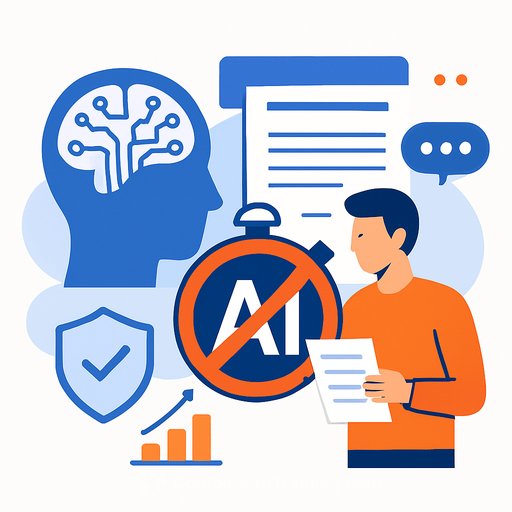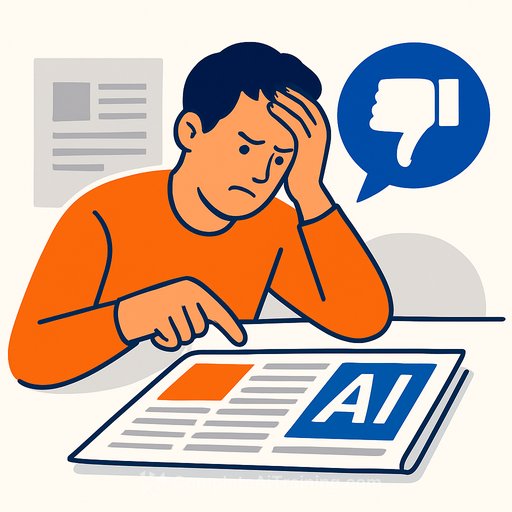New Report: Writers Are Leaning Into AI - Fiction Authors Are Holding Back
A new survey of 1,481 working writers (1,190 writing professionals and 291 fiction authors) shows a clear pattern: most professional writers are using AI, while fiction authors remain cautious.
Overall, 61% of writers report using AI tools and say they're 31% more productive because of it. Yet only 7% of respondents have published AI-generated text as-is. Most use AI as an assistant, not a ghostwriter.
Key Numbers You Should Know
- 61% of all writers use AI; average productivity lift: 31%.
- 63% use AI to generate text they then edit; only 7% publish AI-generated text.
- Heaviest users: thought leadership writers (84%), PR/comms (73%), content marketing (73%).
- Least likely (excluding fiction): copy editors (33%), journalists (44%), technical writers (52%).
- Average AI user runs 3.6 tasks per week; most common tool: ChatGPT.
- 9 in 10 writers worry about hallucinations/factual errors.
- Copyright worries are near-universal among nonusers; only 61% of advanced users share that concern.
- Freelance market signal: nearly half of freelancers report reduced demand; 21% of advanced users see increased demand.
How Writers Actually Use AI
Daily help: search and quick lookups. Less frequent but common: brainstorming, title/heading options, and thesaurus-style wording tweaks.
In short, AI is a drafting and ideation tool for most writers-not a "publish button." That lines up with the low 7% publishing rate.
Who's Using AI the Most (and Least)
Thought leadership, PR/comms, and content marketing writers are the heaviest adopters. These roles value speed, ideation, and repackaging-areas where AI helps.
Copy editors, journalists, and technical writers show more restraint, likely due to accuracy and voice standards. That caution is reasonable given the high concern over hallucinations.
Freelancers: Demand Is Shifting
Among 806 freelancers and small agency respondents, nearly half report reduced demand tied to AI. About three in four freelancers and corporate workers expect fewer opportunities ahead.
Still, 21% of advanced users say demand increased. The gap suggests clients are moving budget toward pros who integrate AI responsibly and deliver faster without sacrificing quality.
Fiction Authors: Wary, With Selective Use
Only 42% of fiction authors use AI at least sometimes. Those who do are largely positive: 60% say it improves quality and 87% report productivity gains.
Most common tasks: brainstorming, search, and help finding the right phrase. Just 11% use it for publishable text.
Nonusers are nearly unanimous in rejecting AI training on their copyrighted work and are strongly concerned about hallucinations, lowered writing value, and bland output.
What This Means for Your Workflow
The trend is clear: strategic AI users are getting more done, but raw AI text isn't trusted. The winners pair AI speed with human judgment-fact-checking, voice control, and structure.
If your work depends on accuracy, specialized expertise, or a distinct voice, use AI as a thinking partner and drafting assistant, not an autopilot.
Practical Ways to Use AI (Without Hurting Your Craft)
- Build a "safe tasks" toolkit: research prompts, outline starters, title options, tone rewrites, and punch-up passes for clarity.
- Keep a fact-check gate: add links, sources, and notes to every AI-assisted draft. No unchecked claims.
- Create a voice sheet: 5-10 examples of your tone, common phrases, and pacing cues. Feed it to the model before generating.
- Set a usage rule: AI can suggest and draft; you own structure, insight, and final language.
- Track ROI: measure time saved per task, revision cycles, and client acceptance rates. Double down where the data's good.
If You're a Freelancer
Clients are price-anchoring to AI speed. Your edge is judgment, accuracy, and voice. Package services accordingly: "AI-assisted, human-edited" with clear QA steps and turnaround SLAs.
Upskill on prompt design, verification, and content systems. If you want structured training to level up fast, explore AI courses by job.
Bottom Line
AI is a force multiplier for professionals who keep the human parts human: ideas, judgment, and voice. Fiction authors remain cautious-and for good reasons around originality and rights-but even there, selective use for brainstorming and phrasing is gaining ground.
Use AI to think better and work faster. Publish only what you'd sign your name to.
Your membership also unlocks:





